By John Y. Brown III, on Mon Jan 16, 2012 at 2:00 PM ET Martin Luther King, Jr in his own words.
Historic words that changed a nation and defined an movement one afternoon not too many years ago. Words were MLK Jr’s weaponry.
He proved that the pen can indeed sometimes be mightier than the sword (or gun, or burning cross or fire hose, as the case may be). But only if the words are borne of conviction, selected masterfully, and used in the service of a calling.
Which brings me to my oddest but personally important lessons from MLK Jr.
Years ago when I was in college I read somewhere that MLK Jr used to be caught reading the dictionary. He loved words…and saw early on the power and force verbal persuasion can have on a nation.
It encouraged me to “read” my dictionary. My old college Merriam-Webster dictionary, by the time I finished college, was the one book in my library that left no doubt that the owner had gotten his money’s worth.
Read the rest of…
John Y’s Musings from the Middle: What King Taught Me About Words
By Jonathan Miller, on Sun Jan 15, 2012 at 9:00 AM ET New to The Recovering Politician? Would you enjoy some good reading on a slow, cold holiday?
Enjoy the Best of The Recovering Politician 2011 below:
 We’ll start with Me because, well…uh…I paid for that microphone. I started the site by explaining Why March Madness Matters and ended the year arguing that Adam Sandler Saved the Jews. In between, I made The Liberal Case for Israel, I outlined Debt Ceilings and Credit Downgrade for Dummies, and shared my Top Five lists for about everything. (My favorite – Jew-ish Gentiles in Pop Culture). All and all, I can’t thank you enough for indulging my part-time, unpaid writing career. We’ll start with Me because, well…uh…I paid for that microphone. I started the site by explaining Why March Madness Matters and ended the year arguing that Adam Sandler Saved the Jews. In between, I made The Liberal Case for Israel, I outlined Debt Ceilings and Credit Downgrade for Dummies, and shared my Top Five lists for about everything. (My favorite – Jew-ish Gentiles in Pop Culture). All and all, I can’t thank you enough for indulging my part-time, unpaid writing career.
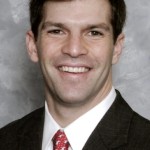 Our most popular writer, hands down, has been contributing RP and former Missouri State Senator Jeff Smith. Jeff’s first piece — the story of his rise into national celebrity, his dramatic fall that resulted in a prison term, and his hopes for redemption — put the RP on the national map, earning recognition from New York magazine’s “Approval Matrix.” Jeff’s followup — about love and sex behind bars — drew in nearly 100,000 readers, literally crashing the Web site. Jeff’s become a national sensation — expect much more from him in 2012. Our most popular writer, hands down, has been contributing RP and former Missouri State Senator Jeff Smith. Jeff’s first piece — the story of his rise into national celebrity, his dramatic fall that resulted in a prison term, and his hopes for redemption — put the RP on the national map, earning recognition from New York magazine’s “Approval Matrix.” Jeff’s followup — about love and sex behind bars — drew in nearly 100,000 readers, literally crashing the Web site. Jeff’s become a national sensation — expect much more from him in 2012.
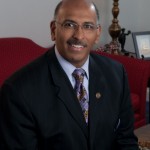 Contributing RP Michael Steele was already a national sensation before he joined the site — you know him as the former Lt. Governor of Maryland, as well as the Chairman of the Republican National Committee. Now a regular contributor to MSNBC, Michael shared with RP readers his vision of the new American Dream, and assessed both President Barack Obama and Supreme Court Justice Clarence Thomas. Over the next few days, Michael will report from the Iowa caucuses; and in the year ahead, he will share his lively take on politics — and other subjects as well. Contributing RP Michael Steele was already a national sensation before he joined the site — you know him as the former Lt. Governor of Maryland, as well as the Chairman of the Republican National Committee. Now a regular contributor to MSNBC, Michael shared with RP readers his vision of the new American Dream, and assessed both President Barack Obama and Supreme Court Justice Clarence Thomas. Over the next few days, Michael will report from the Iowa caucuses; and in the year ahead, he will share his lively take on politics — and other subjects as well.
 Another familiar face at the site in 2011 was another former Lt. Governor of Maryland, contributing RP Kathleen Kennedy Townsend. Kathleen elucidated her well-versed take on faith and politics, while slamming a then-ascendant Rick Perry for misusing faith, defended Sarah Palin(!), and shared her unique perspective as a member of the nation’s most iconic political family. Her most popular piece was on, of all things, home births. Expect the same kind of wide variety from Kathleen at The RP in the coming months. Another familiar face at the site in 2011 was another former Lt. Governor of Maryland, contributing RP Kathleen Kennedy Townsend. Kathleen elucidated her well-versed take on faith and politics, while slamming a then-ascendant Rick Perry for misusing faith, defended Sarah Palin(!), and shared her unique perspective as a member of the nation’s most iconic political family. Her most popular piece was on, of all things, home births. Expect the same kind of wide variety from Kathleen at The RP in the coming months.
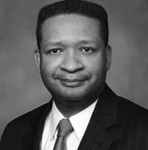 One of the RP’s most prolific contributing RPs was former Alabama Congressman Artur Davis. Artur wrote a fascinating, insightful piece about political authenticity, plunged into the centuries-old debate on race and politics, and explored the Democratic Party’s faith gap. Some of his most popular pieces were book reviews, taking on new works about Harry Truman and Bobby Kennedy. Artur’s not been shy about controversy, angering conservatives by attacking his home state’s “ugly” immigration law, and riling liberals by supporting its new Voter ID law. Don’t expect Artur to pull any punches in 2012. One of the RP’s most prolific contributing RPs was former Alabama Congressman Artur Davis. Artur wrote a fascinating, insightful piece about political authenticity, plunged into the centuries-old debate on race and politics, and explored the Democratic Party’s faith gap. Some of his most popular pieces were book reviews, taking on new works about Harry Truman and Bobby Kennedy. Artur’s not been shy about controversy, angering conservatives by attacking his home state’s “ugly” immigration law, and riling liberals by supporting its new Voter ID law. Don’t expect Artur to pull any punches in 2012.
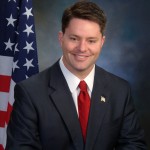 Contributing RP and former Missouri state House Speaker Rod Jetton is also one who is not a stranger to controversy. At the peak of his power, Rod was charged with ethics and criminal violations, and while he was cleared of everything, he stepped down to begin his second act. Rod’s 3-part series about his “Success, Scandal and Change” was one of the site’s most widely read, and he concluded the year with a touching 4-part series on his best friend, a fallen Marine. In the middle, he showed off a wry sense of humor in a video interview with his unlikely pal, contributing RP Jeff Smith (you have to see Rod’s imitation of Jeff). Contributing RP and former Missouri state House Speaker Rod Jetton is also one who is not a stranger to controversy. At the peak of his power, Rod was charged with ethics and criminal violations, and while he was cleared of everything, he stepped down to begin his second act. Rod’s 3-part series about his “Success, Scandal and Change” was one of the site’s most widely read, and he concluded the year with a touching 4-part series on his best friend, a fallen Marine. In the middle, he showed off a wry sense of humor in a video interview with his unlikely pal, contributing RP Jeff Smith (you have to see Rod’s imitation of Jeff).
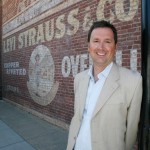 Jason Atkinson, an Oregon State Senator and contributing RP, underwent a different kind of political recovery — he had to withdraw from a promising gubernatorial campaign after he accidentally shot himself while hunting. He writes about the experience — with graphic charts — in “A Real Political Recovery,” but also created an Internet sensation with short films he directed on more successful outdoor adventures fishing for trout in “Big Mo” and “Half Pounder.” He also showed off his own wicked sense of humor, imitating Abe Lincoln and citing the wisdom of Homer…Simpson that is. Jason Atkinson, an Oregon State Senator and contributing RP, underwent a different kind of political recovery — he had to withdraw from a promising gubernatorial campaign after he accidentally shot himself while hunting. He writes about the experience — with graphic charts — in “A Real Political Recovery,” but also created an Internet sensation with short films he directed on more successful outdoor adventures fishing for trout in “Big Mo” and “Half Pounder.” He also showed off his own wicked sense of humor, imitating Abe Lincoln and citing the wisdom of Homer…Simpson that is.
 Our newest contributing RP, former Virginia Congressional Democratic nominee Krystal Ball, has already generated considerable reader interest with her first piece about Why We Need More Women in Politics. Krystal should know; her first campaign for office was interrupted by a ridiculous media inquiry into pictures taken of her in college; PG-13 pictures that caused a mini-national-sensation only because of Krystal’s gender. As a regular contributor to MSNBC and here at The RP, Krystal will help us view politics in a much different way. Our newest contributing RP, former Virginia Congressional Democratic nominee Krystal Ball, has already generated considerable reader interest with her first piece about Why We Need More Women in Politics. Krystal should know; her first campaign for office was interrupted by a ridiculous media inquiry into pictures taken of her in college; PG-13 pictures that caused a mini-national-sensation only because of Krystal’s gender. As a regular contributor to MSNBC and here at The RP, Krystal will help us view politics in a much different way.
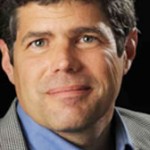 Finally, I feel very fortunate — and so is the RP Nation — to have convinced my good friend, contributing RP, and former Kentucky Secretary of State, John Y. Brown, III to share his incisive social and political commentary, along with his uproarious sense of humor, at The RP. John Y. helped set the theme and tone of the site with his early piece, “What Do We Do Now?,” in which he offered a 20-question quiz to help readers determine if they were in need of political recovery. More recently, we’ve launched a regular feature, John Y.’s Musings from the Middle, in which he shares his wit and wisdom on topics varying from fruitcake to the death penalty to Lindsay Lohan. We guarantee a lot of laughs, as well as thoughtful advice, in the year ahead. Finally, I feel very fortunate — and so is the RP Nation — to have convinced my good friend, contributing RP, and former Kentucky Secretary of State, John Y. Brown, III to share his incisive social and political commentary, along with his uproarious sense of humor, at The RP. John Y. helped set the theme and tone of the site with his early piece, “What Do We Do Now?,” in which he offered a 20-question quiz to help readers determine if they were in need of political recovery. More recently, we’ve launched a regular feature, John Y.’s Musings from the Middle, in which he shares his wit and wisdom on topics varying from fruitcake to the death penalty to Lindsay Lohan. We guarantee a lot of laughs, as well as thoughtful advice, in the year ahead.
By Artur Davis, on Thu Jan 5, 2012 at 8:30 AM ET 
There is a perception that OJ Simpson in his vintage years, the mid seventies, was the last cultural icon who wore a football jersey. In contrast, it is said that the modern football era has yielded an array of physically gifted, prodigiously skilled athletes who have shattered records and redefined the limits of the game, but have made no deep imprint on the society that reveres their talent.
The last part is a true enough description of the largely impact free zone of the contemporary football star. The first observation, however, is flawed memory. It was not Simpson, for all his California glitter and celebrity, who was the last of a kind—it was a Mississippian who migrated north named Walter Payton. Jeff Pearlman, in his 2011 biography of the Chicago Bears Hall of Famer, “Sweetness”, reminds us that for about a decade, well beyond the normal career span of an NFL back, Walter Payton was the exemplary star who resonated well beyond his sport–especially if you were a Chicagoan eager for a hero in the aftermath of that city’s dismal decade of the seventies; an African American who relished the style of a charismatic HBCU grad effortlessly crossing racial barriers; or a lover of an underdog story who understood the depths in the South from which Payton ascended.
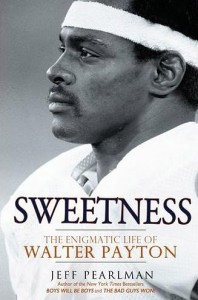 Click on image to purchase book Even for Americans who only dimly knew the fine print of Payton’s athletic feats, he was the 80s sports celebrity who died too early and through no fault of his own, and his demise in 1999 from a rare liver cancer at 46 provoked tributes fit for the civic legend he had become.
“Sweetness” is a minutely researched, powerfully written narrative that gives the iconic side of Payton its due, but may be the most controversial sports biography of the past year. The football side of the account is not in dispute; to a degree not well remembered today, Payton was uncommonly good for an astonishingly long time. From 1976 to 1986, Payton amassed over 1200 yards each full season, topped the NFL record books for career rushing yards (and still ranks second, behind only Emmitt Smith), and at one point held the record for single game yards and consecutive 100 yard games. In a sport where the brutality of contact erodes skills quickly, Payton’s prolonged brilliance still arguably makes him the finest running back the NFL has produced.
Read the rest of…
Artur Davis: “Sweetness”
By RP Staff, on Fri Dec 9, 2011 at 12:00 PM ET Contributing RP Tom Allen, a former Congressman from Maine, is working on a new political book, reports Seth Koenig of the Bangor Daily News:
Former U.S. Rep. Tom Allen, a Democrat, and I happened to be leaving a media event in South Portland at the same time Tuesday. We chatted for just a few moments before he hopped into the passenger seat of a waiting sedan, undoubtedly off to another obligation (as president of the Association of American Publishers and a member of several organization boards, he keeps busy).
I asked how he’s liking life outside of the “political crossfire.”
He said he’s loving it. But he’s not staying out of the political crossfire forever.
Allen, who served 12 years in the House before giving up the seat to challenge Republican Susan Collins in 2008 for her Senate seat (unsuccessfully), said he’s working on a book about politics he hopes will hit shelves next year.
“It’s about the ideas that separate Rs and Ds,” the former Portland mayor said. “It explains everything.”
Allen still has strong opinions about politics, as evidenced by guest columns he’s written for the website The Recovering Politician (click here or here for some of his recent opinions about the atmosphere in Congress — he’s not ambiguous about which political movement he feels is to blame for ongoing Capitol Hill hostility).
Click here to read the full article.
And stay tuned to The Recovering Politician for more developments on Tom Allen’s literary career.
By Artur Davis, on Mon Dec 5, 2011 at 8:30 AM ET  Harry Truman is the one president widely admired today who was generally reviled in his own times. There was no cult of personality around Truman while he was in the White House; to the contrary, he eventually logged the lowest approval ratings in Gallup’s history, just nudging out Richard Nixon on the eve of resignation. His legislative record was anemic. He failed to curb the anti-communist fervor known as McCarthyism, and the carnage of the Korean War is part of his resume. Harry Truman is the one president widely admired today who was generally reviled in his own times. There was no cult of personality around Truman while he was in the White House; to the contrary, he eventually logged the lowest approval ratings in Gallup’s history, just nudging out Richard Nixon on the eve of resignation. His legislative record was anemic. He failed to curb the anti-communist fervor known as McCarthyism, and the carnage of the Korean War is part of his resume.
The fact Truman endures is a testament to two factors: the first, his exemplary decision to assert American leadership on behalf of democratic elements under siege, from Greece to Israel, denied the Soviet Union ownership of the second half of the 20th Century. Second, he won a campaign, improbably, heroically, and defiantly in the face of outlandish odds.
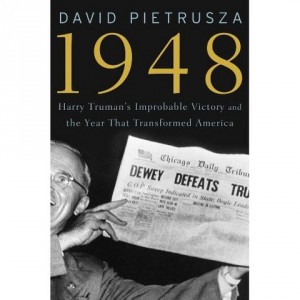 Click on picture above to purchase book That second event is the subject of David Pietrusza’s latest presidential campaign history, “1948”, a worthy successor to “1920: The Year of the Six Presidents”, a superb recounting of a largely forgotten political season, and “1960: JFK v. LBJ v. Nixon”, which manages to shed fresh details on that year’s epic. Pietrusza opts for the brisk narrative/character sketch (think “The Making of the President”, but with no pretense of grandeur), over the minute retelling of every seminal event that weighs down Edmund Morris’ series on Teddy Roosevelt or John Milton Cooper’s well regarded 2008 biography of Woodrow Wilson. It is less grand history than a jaunty, essayist’s rendition—imminently readable and revealing.
The best recalled aspect of “1948” is the seemingly helpless state Truman found himself in at the outset of the race: his Democratic Party was deeply split, with a sizable number of liberals regarding Truman as simultaneously too adventurous with his foreign policy and too feckless on the domestic side. The southern wing of the party was equally disgruntled, and a portion of it was intent on generating an electoral college deadlock that would make the preservation of segregation for another generation the ticket for a deal. The country seemed fatigued with Rooseveltian liberalism, and the Republican front-runner, New York Governor Tom Dewey, seemed inoffensive and competent enough to win easily.
Read the rest of…
Artur Davis: David Pietrusza’s “1948”
By Ronald J. Granieri, on Mon Nov 21, 2011 at 8:30 AM ET 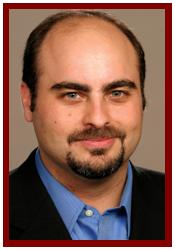 In 1963, William F. Buckley, Jr. quipped “I would rather be governed by the first 2000 names in the Boston phone book than the faculty of Harvard University.” The quote has been passed around so often in various forms (my initial Google search this morning returned more than seventy million hits), with and without attribution to the late Mr. Buckley, that the original context of the comment (a jab at the Kennedy brain trust) is lost in the mist. In 1963, William F. Buckley, Jr. quipped “I would rather be governed by the first 2000 names in the Boston phone book than the faculty of Harvard University.” The quote has been passed around so often in various forms (my initial Google search this morning returned more than seventy million hits), with and without attribution to the late Mr. Buckley, that the original context of the comment (a jab at the Kennedy brain trust) is lost in the mist.
At the risk of alienating many of my readers, I will declare right now that Buckley has been one of my heroes since my teenage years. However my opinions on specific issues may have diverged from his over time, Buckley’s sparkling wit and clarity of thought continue to inspire me. I still read his works for pleasure, and measure my own poor writing style against his.
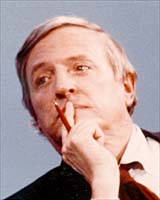 Even the cleverest comments from great thinkers, however, can be dangerous when they are wrenched from their original context and take on a life of their own. (Thomas Jefferson, the tree of liberty, and the blood of tyrants come to mind…) Buckley’s Boston phone book quote is just such a comment. It has become a popular rhetorical tic among conservatives, and threatens to be more damaging to the conservative intellectual project than anything ever dreamt up on the left. Even the cleverest comments from great thinkers, however, can be dangerous when they are wrenched from their original context and take on a life of their own. (Thomas Jefferson, the tree of liberty, and the blood of tyrants come to mind…) Buckley’s Boston phone book quote is just such a comment. It has become a popular rhetorical tic among conservatives, and threatens to be more damaging to the conservative intellectual project than anything ever dreamt up on the left.
The quote, and the attitude behind it, has been in a great deal of conscious and unconscious circulation of late, as Republican presidential candidates attempt to contrast themselves with President Obama and to deal with their own occasional lapses of knowledge or eloquence. Thus we have Rick Perry, fresh off recent debate catastrophes, saying to all who would listen, “I am a doer, not a talker. ” Similarly, Herman Cain, far from embarrassed about his lack of facility in discussing complicated international events, has embraced ignorance, proclaiming (in unconscious echo of a classic moment from The Simpsons): “We need a leader, not a reader.” In this time of crisis, these messages suggest, the country should reject intellectual attainment in favor of someone unfettered by too much thinking.
Read the rest of…
Ronald J. Granieri: Up From Ignorance
By Ronald J. Granieri, on Wed Jul 20, 2011 at 8:30 AM ET  Last April, the organizers of the annual “College-palooza” at the University of Pennsylvania invited me to participate in their series of “one minute lectures,” where professors had one minute to crystallize their approach to their subjects. I figured that it would be a challenge to say anything coherent in only a minute, but at the same time found the experience to be quite stimulating as I tried to make a point that I often hint at in my undergraduate lectures. Last April, the organizers of the annual “College-palooza” at the University of Pennsylvania invited me to participate in their series of “one minute lectures,” where professors had one minute to crystallize their approach to their subjects. I figured that it would be a challenge to say anything coherent in only a minute, but at the same time found the experience to be quite stimulating as I tried to make a point that I often hint at in my undergraduate lectures.
This is the complete text:
“I am often asked: What does History teach us?
History doesn’t teach us anything. Historians do. History is not some independent abstraction; it is the attempt by human beings to make sense of the past.
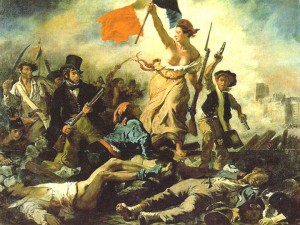 Viewing history with the ironic distance of the hip moviegoer breeds a dangerous sense of superiority over historical actors, and the equally dangerous assumption that simply identifying past mistakes will grant mastery over the present and guarantee future success. Remembering the human dimension can help us avoid those dangers. Viewing history with the ironic distance of the hip moviegoer breeds a dangerous sense of superiority over historical actors, and the equally dangerous assumption that simply identifying past mistakes will grant mastery over the present and guarantee future success. Remembering the human dimension can help us avoid those dangers.
Historical actors are human beings, not necessarily any smarter or dumber than we are. Their weaknesses are ours: the limitations of individual perception and the inability to see the future.
Read the rest of…
Ronald J. Granieri: History, Mastery, Utility: Or, the Public Responsibility of Historians
By Kathleen Kennedy Townsend, on Tue Jul 19, 2011 at 8:30 AM ET 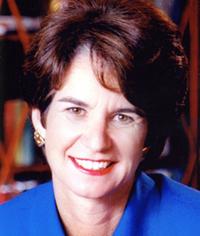 A few weeks ago, I was reading Walt Whitman, enthralled by the energy and rhythm of his poetry. It’s easy to see why he was embroiled in fights with 19th-century censors. “I will go to the bank by the wood and become undisguised and naked,” he wrote, “I am mad for it to be in contact with me.” In Song of Myself, he praises “a well-made man,” saying, “dress does not hide him;/The strong, sweet, supple quality he has strikes through the cotton and flannel;/To see him pass conveys as much as the best poem, perhaps more;/You linger to see his back, and the back of his neck and shoulder-side.” A few weeks ago, I was reading Walt Whitman, enthralled by the energy and rhythm of his poetry. It’s easy to see why he was embroiled in fights with 19th-century censors. “I will go to the bank by the wood and become undisguised and naked,” he wrote, “I am mad for it to be in contact with me.” In Song of Myself, he praises “a well-made man,” saying, “dress does not hide him;/The strong, sweet, supple quality he has strikes through the cotton and flannel;/To see him pass conveys as much as the best poem, perhaps more;/You linger to see his back, and the back of his neck and shoulder-side.”
And these are some of the milder passages. These probably aren’t the ones that got him fired from his job at the Department of the Interior and charged with “that horrible sin not to be mentioned among Christians.”
What’s most shocking about his writing today is not that he loves men or describes “the body electric.” What’s stunning is his democratic sensibility.
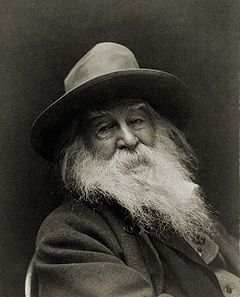 What a long way we’ve come. Whitman, who lived in Brooklyn for 28 years, would be astounded that New York has actually legalized same-sex marriage. He would have been equally amazed by a recent article in the New York Times about an effort to recruit more gays and lesbians into politics. And I’m sure his eyes would have widened a few weeks ago when the Federal Reserve Bank of Richmond ran a rainbow flag up its flagpole at the request of a group of gay and lesbian employees in honor of gay pride month. What a long way we’ve come. Whitman, who lived in Brooklyn for 28 years, would be astounded that New York has actually legalized same-sex marriage. He would have been equally amazed by a recent article in the New York Times about an effort to recruit more gays and lesbians into politics. And I’m sure his eyes would have widened a few weeks ago when the Federal Reserve Bank of Richmond ran a rainbow flag up its flagpole at the request of a group of gay and lesbian employees in honor of gay pride month.
These events–especially the New York decision–are victories in the fight for gay and lesbian equality. New York has joined a handful of other states where people who love each other can make a legal commitment in a public ceremony and announce to the world at large: We are men and women with hopes and dreams. The promise of freedom, equality, and happiness in the Declaration of Independence applies to us, just as it applies to you.
Read the rest of…
Kathleen Kennedy Townsend: Walt Whitman and the Soul of Democracy
By Jonathan Miller, on Tue Apr 19, 2011 at 12:30 PM ET My teenage daughter and I BOTH love it. So go forth, click, buy & read! Furiously patting myself on the back for sucessfully introducing Nick Hornby’s masterpiece, High Fidelity, to my 17-year-old daughter, I’ve decided to make a tradition of aping the protagonist’s habit of breaking down pop culture categories into top five lists. (See my post on Top Five Breakup Songs here).
And now that the depression of March Madness has dissipated, and the ennui of the NBA playoffs has set in, there’s no better time to pick up a great book (or five) about basketball.
Unfortunately, with the qualifiation of the word “great” in the sentence above, there are not many to choose from. While the literary elite has focused its attention on the diamond or the gridiron, hoops have been sorely neglected.
There are, however, some exceptional exceptions. Click on the book covers below to preview and/or purchase):
1. The Breaks of the Game by David Halberstam
The best book on basketball — and in my not-so-humble-by-any-means opinion, the best book on any sport, exclamation point — celebrates its 30th anniversary this year. You probably have never heard of it, and I wouldn’t have either, had I not read Bill Simmons’ The Book on Basketball (See #3 below). The late, Pulitzer-Prize winning reporter Halberstam followed the 1976-77 Portland Trailblazer NBA Champs in the years following their title, through injuries (most prominently to star center Bill Walton), dissension, trades, discontent, and sometimes, triumph. Halberstam eloquently illustrates through his prose that basketball — as I argued in my inaugural RP post, “Why March Madness Matters” — is the ultimate communitarian sport: Players and teams only can achieve greatness when individuals put aside their selfish needs to advance the common good.
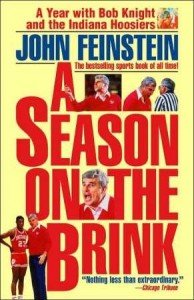 2. A Season on the Brink by John Feinstein 2. A Season on the Brink by John Feinstein
The best book on college hoops was born when John Feinstein was granted permission to spend the year with the University of Indiana Hoosiers and its coach, Bobby Knight, who is perhaps the most controversial and polarizing team leader of his generation in any sport. This uncensored examination of how the pressures of the sport affect a coaching staff and its mostly teenage squad of players captures brilliantly how big-time college sports has emerged to transcend (some will say, offend) the Athenian ideals of amateurism, and become a professional institution of its own. And remember — this was written after the 1985-86 season, in the infancy of the March Madness phenomenon, which many argue began with the 1979 NCAA Championship, pitting a different kind of hoosier — Indiana State’s Larry Bird — against Earvin “Magic” Johnson of Michigan State.
3. The Book of Basketball by Bill Simmons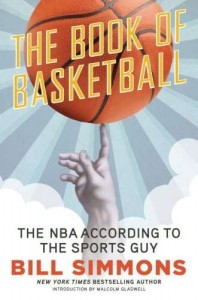
To be clear (as admitted in the subtitle, “The NBA According to the Sports Guy”), this is really “The Book of Professional Basketball.” But despite mostly ignoring the finer collegiate variety of the game, this is a fascinating read — the kind of book that both provides tidy places for reading breaks, but also encourages you to read on and on. Simmons is at times hilarious, profane, and viciously jingoistic (He is a self-admitted Boston Celtic fanatic). The reader’s thirst for hoops information is fully slaked through reams of statistics, colorful stories, and witty pop-culture-laden metaphors, but Simmons also weaves through the book a wonderful narrative theme, borrowed from his favorite basketball tome, Halberstam’s The Breaks of the Game (See #1, above): “The secret of basketball is that it’s not about basketball…Teams only win titles when their best players forget about statistics, sublimate their own games for the greater good and put their egos on hold.”
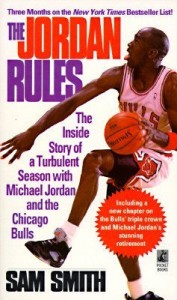 4. The Jordan Rules by Sam Smith 4. The Jordan Rules by Sam Smith
The book that famously tarnished the uber-Man Michael Jordan myth created by Nike and the NBA (and discussed brilliantly by David Sirota in his new book, Back to Our Future), vividly captured the human side of the living legend: his temper tantrums, his biting critiques of his teammates, and his emerging super-sized ego. But the book also demonstrates how Jordan’s Zen-master coach Phil Jackson was able to direct Jordan and his teammates to emerge as one of the greatest squads in NBA history, by focusing the star’s attention (Here we go again!) away from personal scoring statistics to unselfish team play.
5. Duke Sux by Christian Laettner
In this touching — sometimes even moving — confessional memoir, former Duke University All-American center, Christian Laettner, apologizes to college hoops fans everywhere for the arrogant attitude of his squad, of the Duke student body, and most importantly, of himself. A key chapter is dedicated to his asking for forgiveness for his famous foot-stomping of Kentucky Wildcat reserve Aminu Timberlake during the historic 1992 NCAA Regional Finals, and his admission that the Blue Devils’ NCAA Championship that year should be vacated and given to the Kentucky Wildcat squad that almost beat them during the Greatest Game Ever Played/Worst Moment in World History.
—-
OK, OK. I might have made up one of the books above. (I told you this genre was bereft of classics!)
Please guess which one is the fake in the comments below. Or let me know what great hoops books I’ve missed.
By Artur Davis, on Wed Apr 13, 2011 at 8:30 AM ET  Political novels are a dying breed, and the death has been a long, slow one. But into the void steps Jeff Greenfield with a smart, well conceived set of political short stories called “Then Everything Changed“. In less than 400 pages, Greenfield, one of Robert Kennedy’s best speechwriters and an accomplished journalist, pulls off what is arguably the best political fiction in the last generation: it will and should endure for its skill and its contribution to our imagination. The book is built on three novellas: the premise of each is that a particular historical fact happened a fraction of an inch differently, and that the political world was realigned accordingly. The first supposes that a would be assassin lurking outside John Kennedy’s Florida getaway in December 1960 carried out his plot to steer a car loaded with explosives into the President elect’s path; and that the tragedy thrusts Lyndon Johnson into power three years early, and makes LBJ the leader who faces Soviet aggression in Berlin and Cuba. If the actual fact that JFK was stalked by an potential assassin during his transition is so obscure today that some of Kennedy’s own biographers don’t know it, the second “what if” has been fodder for speculation for two generations: Greenfield’s version is that Sirhan Sirhan‘s hastily improvised shooting of RFK is thwarted and that Kennedy lives to face off against Hubert Humphrey in a thrilling Democratic convention and Richard Nixon in a close run fall campaign. His prize is a country with outsized expectations of a second Camelot, which he must navigate as he tries to pursue a tough-minded liberalism that stirs up dust from the left and right. Political novels are a dying breed, and the death has been a long, slow one. But into the void steps Jeff Greenfield with a smart, well conceived set of political short stories called “Then Everything Changed“. In less than 400 pages, Greenfield, one of Robert Kennedy’s best speechwriters and an accomplished journalist, pulls off what is arguably the best political fiction in the last generation: it will and should endure for its skill and its contribution to our imagination. The book is built on three novellas: the premise of each is that a particular historical fact happened a fraction of an inch differently, and that the political world was realigned accordingly. The first supposes that a would be assassin lurking outside John Kennedy’s Florida getaway in December 1960 carried out his plot to steer a car loaded with explosives into the President elect’s path; and that the tragedy thrusts Lyndon Johnson into power three years early, and makes LBJ the leader who faces Soviet aggression in Berlin and Cuba. If the actual fact that JFK was stalked by an potential assassin during his transition is so obscure today that some of Kennedy’s own biographers don’t know it, the second “what if” has been fodder for speculation for two generations: Greenfield’s version is that Sirhan Sirhan‘s hastily improvised shooting of RFK is thwarted and that Kennedy lives to face off against Hubert Humphrey in a thrilling Democratic convention and Richard Nixon in a close run fall campaign. His prize is a country with outsized expectations of a second Camelot, which he must navigate as he tries to pursue a tough-minded liberalism that stirs up dust from the left and right.
The final premise is not built around life and death, but around the power of words never
 How would these changed events have affected Chevy Chase's career? spoken. It imagines that Gerald Ford managed to averted a still inexplicable gaffe on foreign policy in a presidential debate with Jimmy Carter, and ended up passing Carter to win a narrow electoral college victory. (It is largely forgotten now that Carter’s win would have been reversed by a shift of less than 15,000 votes in Ohio and Mississippi). It is Ford who governs during the stagflation and drift of the late seventies, and when Ronald Reagan emerges as the nominee four years later, he bears the burden of a decade of failed Republican rule. His opponent, a charismatic one term Colorado Senator named Gary Hart, whose New Democrat aura is the right antidote to more conventional candidacies by Edward Kennedy and Reagan. Anyone engaged (or addled) enough by politics to be reading this blog could spin a nice set of counter- factuals around presidential elections. Where Greenfield surpasses the guessing game is his exceedingly deft injection of real life variables into his fiction. Greenfield’s LBJ remains determined to surpass Kennedy’s martyred luster by a prioritization of voting rights in the South; at the same time, his well documented insecurities make a catastrophic mix with Kruschev’s adventurism in the early sixties. Similarly, the same Bobby Kennedy who bravely exposed himself to a grieving black crowd in Indianapolis the night of Martin Luther King’s death is instantly familiar in the fictional account of RFK facing down a mob of student demonstrators in Chicago at a critical moment at the convention. Greenfield just as credibly suggests that a presidential campaign by Ted Kennedy would have floundered in any timeline under the weight of innuendo and doubts about his character, and that Ronald Reagan’s penchant for tactical boldness (think: the real life near selection of Ford as a running mate in 1980) might have led to a historic choice of a running mate in the fictional version of 1980.
Read the rest of…
Artur Davis: “Then Everything Changed”
|
The Recovering Politician Bookstore
|






























